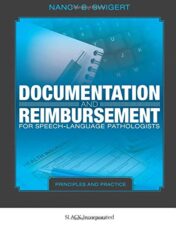Documentation and Reimbursement for Speech-Language Pathologists: Principles and Practice(PDF)
$12
Documentation and Reimbursement for Speech-Language Pathologists: Principles and Practice(PDF)
Section 2 explains the importance of focusing on function in patient-centered care with the ICF as the conceptual model, then goes on to cover each of the types of services speech-language pathologists provide: evaluation, treatment planning, therapy, and discharge planning. Multiple examples of forms and formats are given for each.In section 3, Nancy Swigert and her expert team of contributors dedicate each chapter to a work setting in which speech-language pathologists might work, whether adult or pediatric, because each setting has its own set of documentation and reimbursement challenges. And since client documentation is not the only kind of writing done by speech-language pathologists, a separate chapter on “other professional writing” includes information on how to write correspondence, avoid common mistakes, and even prepare effective PowerPoint presentations.
Each chapter in Documentation and Reimbursement for Speech-Language Pathologists contains activities to apply information learned in that chapter as well as review questions for students to test their knowledge. Customizable samples of many types of forms and reports are also available.
Instructors in educational settings can visit www.efacultylounge.com for additional material to be used for teaching in the classroom.
Documentation and Reimbursement for Speech-Language Pathologists: Principles and Practice is the perfect text for speech-language pathology students to learn these vital skills, but it will also provide clinical supervisors, new clinicians, and speech-language pathologists starting a private practice or managing a department with essential information about documentation, coding, and reimbursement.
Related Products
Psychology Books
Psychology Books
Psychology Books
Psychology Books
Intimate Relationships, 3rd Edition (Original PDF from Publisher)
Psychology Books
Psychology Books
The War for Kindness: Building Empathy in a Fractured World (EPUB)
Psychology Books
Psychology Books
The Age of Empathy: Nature’s Lessons for a Kinder Society (EPUB)
Psychology Books
Dopamine Nation: Finding Balance in the Age of Indulgence (EPUB)
Psychology Books
Psychology Books
Psychology Books
Psychology Books
Counseling and Psychotherapy for South Asian Americans (EPUB)
Psychology Books
The Psychology of Phubbing (SpringerBriefs in Psychology) (EPUB)
Psychology Books
Psychology Books
Developing Competencies for Recovery (Original PDF from Publisher)
Psychology Books
Psychology Books
Social Cognition (Psychology Revivals) (Original PDF from Publisher)
Psychology Books
Psychology Books
Psychology Books
Psychoanalytic Parent-Infant Psychotherapy and Mentalization (EPUB)
Psychology Books
Traumatic Loss and Recovery in Jungian Studies and Cinema (EPUB)
Psychology Books
Psychology Books
Psychology Books
Psychology Books
Sex and Sexuality in Medieval England (Original PDF from Publisher)
Psychology Books
Psychology Books
The Process of Question Answering (Psychology Revivals) (EPUB)
Psychology Books
Psychology Books
Psychology Books
Psychology Books
Psychology Books
Psychology Books
Psychology Books
Psychology Books
Psychology Books
A Jungian Approach to Coaching (Original PDF from Publisher)
Psychology Books







































































































